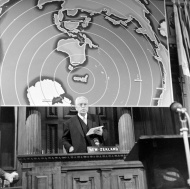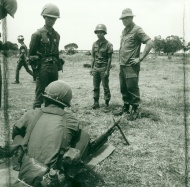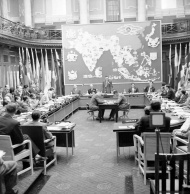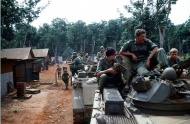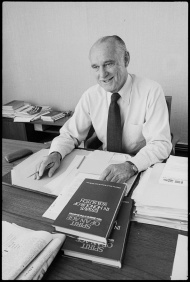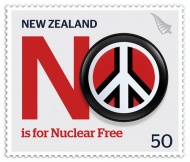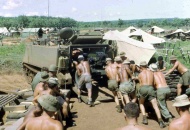Events In History
-
 18 August 1971Deadline for Vietnam pull-out announced
18 August 1971Deadline for Vietnam pull-out announcedPrime Minister Keith Holyoake’s statement in Parliament that New Zealand’s combat force would be withdrawn before the end of the year coincided with a similar announcement by the Australian government. Read more...
-
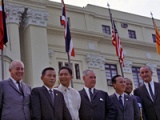 8 September 1954NZ signs Manila Pact
8 September 1954NZ signs Manila PactThe South-East Asia Collective Defence Treaty, or Manila Pact, aimed to contain the spread of communism in the region. The South-East Asia Treaty Organisation (SEATO) was the institutional expression of this treaty. Read more...
Articles
NZ's Search for Security
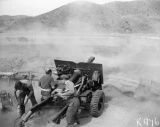
Overview, links to related topics and suggested classroom activities for this potential NCEA topic
-
Page 2 – Overview
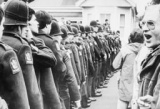
Background information for the NCEA Level 1 history theme New Zealand's Search for Security
-
Page 3 – Related topics
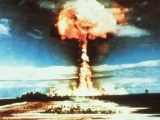
Links to topics relating to the Level 1 NCEA theme New Zealand's Search for Security
The Cold War

Although the origins of the so-called Cold War can be traced back to the Bolshevik revolution of 1917, this intense ideological struggle between the Western powers and the Soviet Union really began after the Second World War.
-
Page 2 – Overview

New Zealand’s participation in the Cold War was shaped by its decision to support the Western powers in their confrontation with the Soviet Union after the Second World War.
-
Page 3 – Choosing sides
New Zealand backed Britain and the United States against the Soviet Union as the Cold War began in the late 1940s. Like the other Western Allies, New Zealand’s relationship
-
Page 4 – Treaties and alliances
During the 1940s and 1950s New Zealand signed a series of collective treaties with Britain and the United States aimed at countering the threats of Japanese military resurgence
-
Page 5 – South-East Asia
During the 1950s the focus of New Zealand’s defence strategy shifted from the Middle East to Asia.
-
Page 6 – Protest and dissent
The end of the Vietnam War shifted the focus of the Cold War away from Asia and New Zealand's need for ‘forward defence’ diminished. These changes, together with the anti-
-
Page 7 – Last decade
Soviet-American tensions revived in the late 1970s as ‘détente’ (co-operation) gave way to a renewed arms race.
-
Page 8 – War at home
Apart from a period during the 1950s, New Zealanders remained relatively tolerant of communism.
-
Page 9 – Further information
Website links and books relating to New Zealand and the Cold War
Korean War

New Zealand was involved militarily in Korea from 1950 to 1957, first as part of the United Nations 'police action' to repel North Korea's invasion of its southern neighbour, and then in a garrison role after the armistice in July 1953.
-
Page 2 – Background
That two Korean states existed in 1950 was an outcome of arrangements for the surrender of Japan in August 1945 which had resulted in the entry of both Soviet and American
-
Page 3 – The 'first' and 'second' Korean Wars
New Zealand was one of the first states to answer the Security Council's call with combat assistance (sixteen would eventually do so). On 29 June, the government offered
-
Page 4 – Kayforce joins the conflict
At this point a further New Zealand contingent joined the UN Command - Kayforce. On 26 July 1950, in response to a further plea from the UN Secretary-General, Trygve Lie, the
-
Page 5 – The Commonwealth Division
In October 1951, now deployed on the Imjin River as part of 28th British Commonwealth Infantry Brigade, the New Zealand gunners took part in Operation Commando, during which
-
Page 6 – End of the conflict
At the end of 1951, a stalemate emerged as both sides improved their defensive positions. The front took on the character of a hilly Western Front. Much bitter fighting took
-
Page 7 – Impact of the War
In all, about 4700 men served with Kayforce and a further 1300 in the frigates during the seven years of New Zealand's involvement in Korea. Forty-five men lost their
-
Page 8 – Korean War Roll of Honour
Roll of Honour for all New Zealanders killed during the Korean War, 1953-57
-
Page 9 – The Bob Jagger photographs
Collection of previously unpublished images of the Korean War by Kiwi Gunner Bob Jagger
-
Page 10 – Kiwi stories
Listen to some of the stories of New Zealanders involved in the Korean War, 1950-1957.
Vietnam War
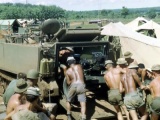
The Vietnam War was New Zealand's longest and most controversial overseas military experience. Although this country's troop commitment and casualties were modest, the conflict aroused widespread protest and condemnation. And for those who fought in Vietnam, it was a tough homecoming.
- Page 1 - The Vietnam WarThe Vietnam War was New Zealand's longest and most controversial overseas military experience. Although this country's troop commitment and casualties were modest, the conflict
The 1951 waterfront dispute

The 1951 waterfront dispute was the biggest industrial confrontation in New Zealand’s history. Although it was not as violent as the Great Strike of 1913, it lasted longer – 151 days, from February to July – and involved more workers.
-
Page 2 – Countdown to confrontation
New Zealanders generally accepted the hardships and restrictions of the war years as necessary in the fight against fascism. After the war, though, many began to demand a
Nuclear-free New Zealand

The sinking of the Greenpeace protest ship Rainbow Warrior in Auckland in July 1985 shocked the nation. The incident galvanised an anti-nuclear movement that had emerged in opposition to both French nuclear tests at Mururoa and American warship visits to New Zealand.
-
Page 3 – Ship visits
The visit of the nuclear-powered frigate USS Texas in 1983 sparked protest in New Zealand.
Biographies
-
 Sutch, William Ball
Sutch, William Ball
Even before his arrest, trial and acquittal on spy charges in the 1970s most New Zealanders had heard of Bill Sutch. He was a prominent citizen – known for his work as an economist, writer, public servant and diplomat.
Read more...
Related keywords
- korean war
- vietnam war
- anzus
- keith holyoake
- prime ministers
- united states
- malayan emergency
- police
- communism
- SEATO
- international relations
- wellington city
- walter nash
- weapons
- oral history
- 1950s
- waterfront dispute
- bill sutch
- refugees
- fiji
- SAS
- parliament
- italian campaign
- WW2
- bob jagger
- photography
- united nations
- protest
- nuclear free
- film
- royal air force
- 1960s
- casualties
- roll of honour
- economy
- spies
- crime
- kayforce
- singapore
- borneo confrontation
- soviet union
- viet cong
- chinese
- nuclear ships
- royal new zealand navy
- royal new zealand air force
- diplomat
- stamps
- flags
- artillery
- workers rights
- demonstrations
- strikes
- labour party
- trade unions
- fintan patrick walsh
- shipping
- ferries
- maps
- cartoon
- 1980s
- americans
- national party
- mururoa protest
- springboks
- poster
- 1970s
-
Main image: Keith Holyoake and Lyndon B. Johnson
New Zealand Prime Minister Keith Holyoake with United States President Lyndon B. Johnson at the White House, 1968.




